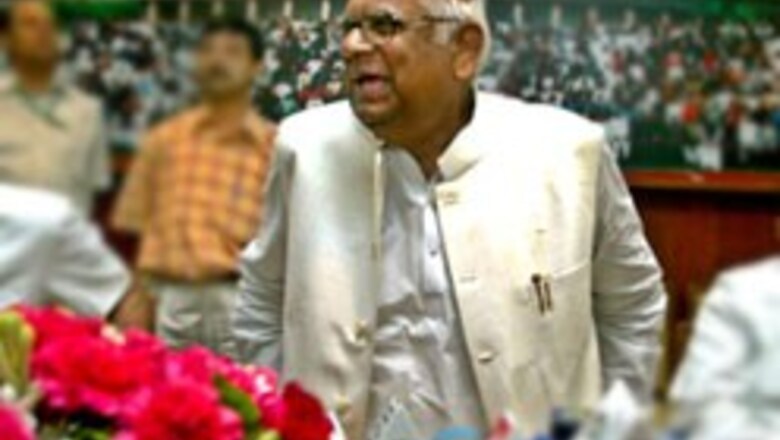
views
One doesn’t know what happens to Somnath Chatterjee from here. Even after his expulsion, he is constitutionally under no obligation to give up his office. After having battled so admirably with a Stalinist party structure, one would hope he stays on. Having expressed his desire not to continue in politics, he must adorn that chair which now befits the stature he has acquired over the years.
Chatterjee has scored heavily in the past month simply by holding on, by being able to brave the onslaught of the party. He has demonstrated beyond doubt that he can take on apparatchiks and will, under no circumstance, mix his politics with his constitutional responsibilities. He has carefully stayed away from the glare of the media, avoided making unnecessary statements. He has not been drawn into any political discussion on his probable change in stance. It is quite possible that given the option, he would have actively pursued the Jyoti Basu line. He wouldn’t have been pushed easily into voting with the BJP.
The CPI-M decision to expel Chatterjee was too predictable. The party knew – as much as the nation knew – that the special session of the fourteenth Lok Sabha belonged not just to Prime Minister Manmohan Singh. It belonged to an equally firm, resolute Bengali bhadralok, who contested his first election as an Independent-backed by the CPI-M. Chatterjee told a group of journalists after the tumultuous trust vote how it was the late Pramod Dasgupta who had sent over two comrades to make him sign on a blank piece of paper. That was his initiation into the party. That signature made him a card-holder.
Yes, his relationship with the party has been quite loose. Chatterjee was the able lawyer who could command authority in the Lok Sabha. The party needed him and used him accordingly. They couldn’t afford to lose him. So when Chatterjee suffered a humiliating defeat to Mamata Banerjee in 1984, he had to be nominated without delay from Bolpur. After the death of Jyotirmoy Bose, he became almost indispensable. For the next 15 years, till he became Speaker, Chatterjee was the only CPI-M MP who could dictate terms when he rose to make a point. He was the party’s face in Parliament.
So, it would be extremely unfair for the CPI-M to claim that they had created Somnath Chatterjee. Chatterjee’s rise had a lot to do with his oratorical talent, his legal acumen, his booming voice and his towering presence. By refusing to be an ordinary foot-soldier of the party, Chatterjee has now raised a question which the CPI-M hates addressing. Can a twenty-first century party be run by enforcing a form of discipline that smacks of Cold War sensibilities? The CPI-M has not been receiving the support of the new middle class because it demands complete surrender, subjugation of a nature that takes away the right to use one’s intellect.
Not just that Chatterjee’s defiance has also raised eyebrows of the CPI-M’s differences with the Indian Constitution. From September 2007, the CPI-M has amply demonstrated that it is not common sense but ideology which decides national interest. By including the name of Chatterjee in the list of MPs who would vote against the nuclear deal, the party has undermined the Indian Constitution and questioned the Speaker’s impartial role. This expulsion and the preceding embarrassment could have been avoided if the leadership in Delhi was prudent and was not itching for a fight.
Chatterjee knew he had lost the party. He probably didn’t assess that by losing the party he had gained national admiration. Overnight, he had become the darling of the middle classes. His many interventions were no longer being dismissed as those of a man who views himself at a headmaster. True, he is a stickler for rules and occasionally he runs the House with a brutal fairness which can be occasionally unfair to a hesitant debutante making his first speech. But then at the end of the day, he is a fair man, whose integrity and impartiality in running the House was never in doubt.
Rahul Gandhi told Somnath Chatterjee during his trust vote speech that he had learnt a lot from him. And Chatterjee himself was more concerned about the health of former Prime Minister Atal Behari Vajpayee when the voting display boards were throwing up strange numbers. Those were significant frozen frames from a day that belonged to history.
Nearly three decades ago, this reporter had borrowed a book on Mao’s Long March from Chatterjee’s library at his Raja Basanta Roy Road residence in Kolkata. Needless to say, the book was never returned. Now that Chatterjee’s own long march with his party comes to an end, it’s time to wish him a new beginning.
(The piece first appeared in The Indian Express)















Comments
0 comment